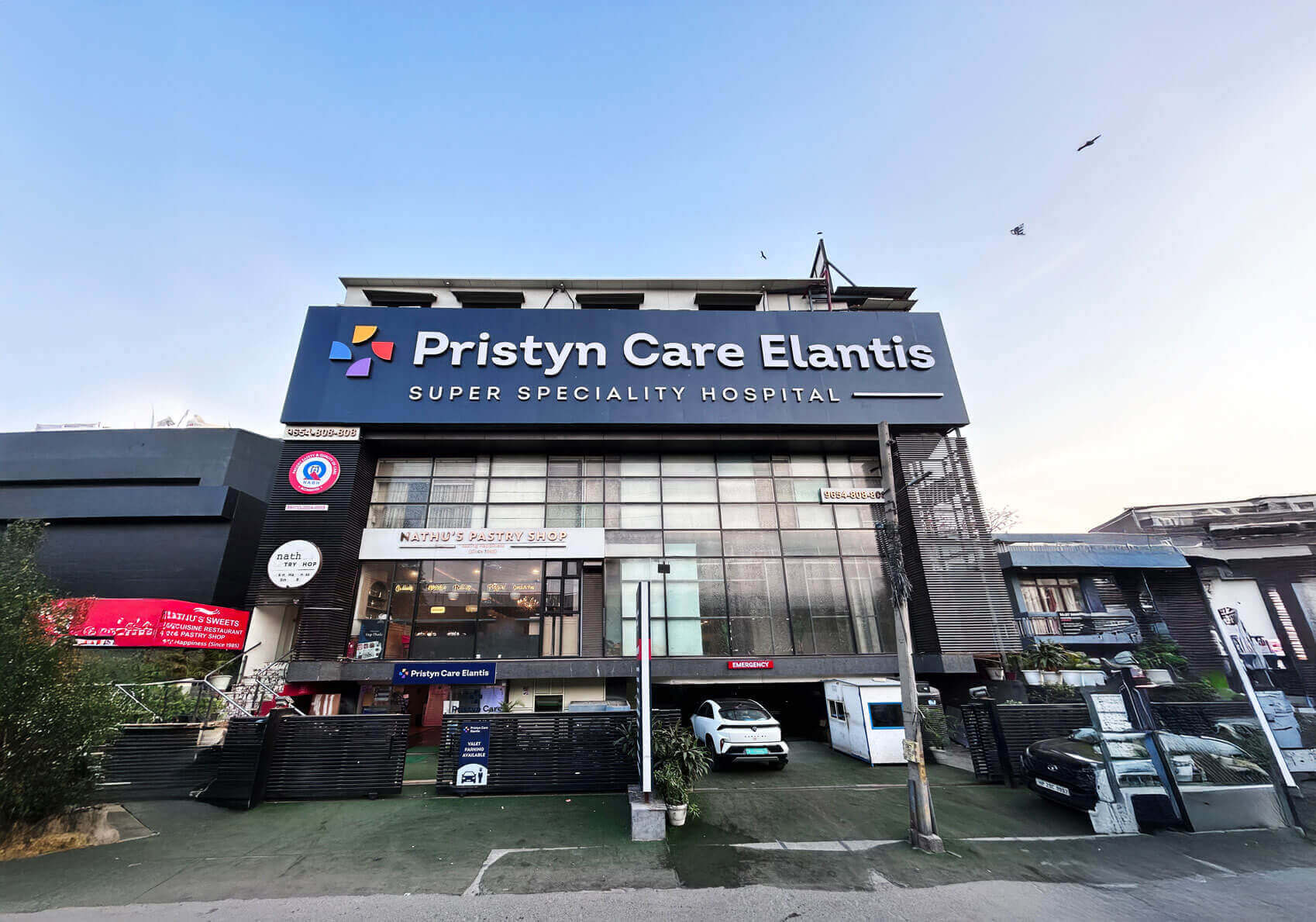
Delhi
USFDA Approved Procedures
Minimally invasive. Minimal pain*.
Insurance Paperwork Support
1 Day Procedure


Vaginal Infection Treatment Options Available at Pristyn Care in Delhi


 NABH
NABH
 50+ Beds
50+ Beds
 24x7 Open
24x7 Open
Pristyn Care Elantis is dedicated to revolutionising surgical care. We combine the latest medical technology with highly skilled professionals and a patient-centric approach to transform the healthcare experience. Our team of doctors at Pristyn Care Elantis, strives to simplify the entire patient journey, ensuring a seamless process from diagnosis through recovery.
We offer specialised treatments across a wide range of medical fields, including proctology, laparoscopic surgery, ENT (ear, nose, and throat), vascular, gynaecology, urology, aesthetics, orthopaedics, ophthalmology, and weight loss solutions.
The Suites & Rooms at Pristyn Care Elantis are designed with your comfort in mind, offering a welcoming ambiance and top-notch amenities to make your stay as pleasant as possible.
Our highly skilled medical team, supported by advanced infrastructure, makes us a trusted choice for comprehensive healthcare solutions.
...Read More
Delivering Seamless Surgical Experience in India
Your safety is taken care of by thermal screening, social distancing, sanitized clinics and hospital rooms, sterilized surgical equipment and mandatory PPE kits during surgery.
A dedicated Care Coordinator assists you throughout the surgery journey from insurance paperwork, to free commute from home to hospital & back and admission-discharge process at the hospital.
Our surgeons spend a lot of time with you to diagnose your condition. You are assisted in all pre-surgery medical diagnostics. We offer advanced laser and laparoscopic surgical treatment. Our procedures are USFDA approved.
We offer free follow-up consultations and instructions including dietary tips as well as exercises to every patient to ensure they have a smooth recovery to their daily routines.
Vaginal infections are typically caused by an imbalance in the normal bacteria or the overgrowth of fungi in the vaginal area. The most common causes include bacterial vaginosis (BV), yeast infections, and sexually transmitted infections (STIs) such as chlamydia or gonorrhoea. Poor hygiene, hormonal changes, certain medications, and an unhealthy diet can also contribute to these infections.
Common symptoms include abnormal vaginal discharge (which may be thick, watery, or have an unusual colour or smell), itching, burning sensations during urination or intercourse, pain, and redness or swelling in the vaginal area. It’s important to consult a healthcare professional if any of these symptoms persist.
To diagnose a vaginal infection, a doctor will typically perform a pelvic examination and may take a sample of the vaginal discharge for laboratory analysis. The results help identify the type of infection, whether bacterial, fungal, or viral, so that appropriate treatment can be prescribed.
Treatment varies depending on the type of infection. For bacterial vaginosis, antibiotics such as metronidazole or clindamycin are commonly prescribed. Yeast infections are typically treated with antifungal medications, either topical creams or oral tablets. If an STI is detected, the appropriate antibiotic or antiviral medication will be prescribed based on the specific infection.
Over-the-counter treatments such as antifungal creams, pessaries, or oral tablets can be effective for treating mild yeast infections. However, it is essential to consult with a healthcare provider before using any over-the-counter product, as misdiagnosing the type of infection could worsen the situation or lead to unnecessary side effects.
While not all infections can be prevented, certain steps can reduce the risk of developing a vaginal infection. These include maintaining good hygiene, wearing breathable cotton underwear, avoiding douching, practising safe sex, and managing any underlying health conditions, such as diabetes, that could increase the risk of infection.
Recovery time depends on the type and severity of the infection. For example, a yeast infection typically improves within a few days of starting antifungal treatment, while bacterial vaginosis may take up to a week for symptoms to subside. It is important to complete the entire course of treatment as prescribed, even if symptoms disappear earlier.
It is generally advised to avoid sexual intercourse while being treated for a vaginal infection, especially if you are undergoing treatment for an STI. Sexual activity can irritate the vaginal area, slow down healing, or spread the infection to your partner. Always consult your healthcare provider for specific guidance.
If left untreated, vaginal infections can lead to more severe health issues. For example, untreated bacterial vaginosis can increase the risk of pelvic inflammatory disease (PID), which can affect fertility. Some untreated STIs may cause chronic pain, infertility, or even transmission to others. Prompt treatment is essential to avoid complications.
You should see a doctor if you experience unusual vaginal discharge, itching, pain, or discomfort that doesn’t improve with over-the-counter treatments, or if you have recurrent infections. It is also important to seek medical advice if you suspect you have an STI, as these often require specific treatment and may not resolve on their own.
To be eligible for vaginal infection treatment, patients should:
The treatment process involves several key steps, ensuring safe and effective care:
Proper preparation ensures smooth treatment and quick recovery. Here’s how to get ready:
After treatment, here’s what you can expect and the recovery tips to follow:
At Pristyn Care, we ensure that every patient receives the best care possible with the following benefits:
Book an appointment today and let Pristyn Care take care of your health with expert vaginal infection treatment.
.svg)
.svg)